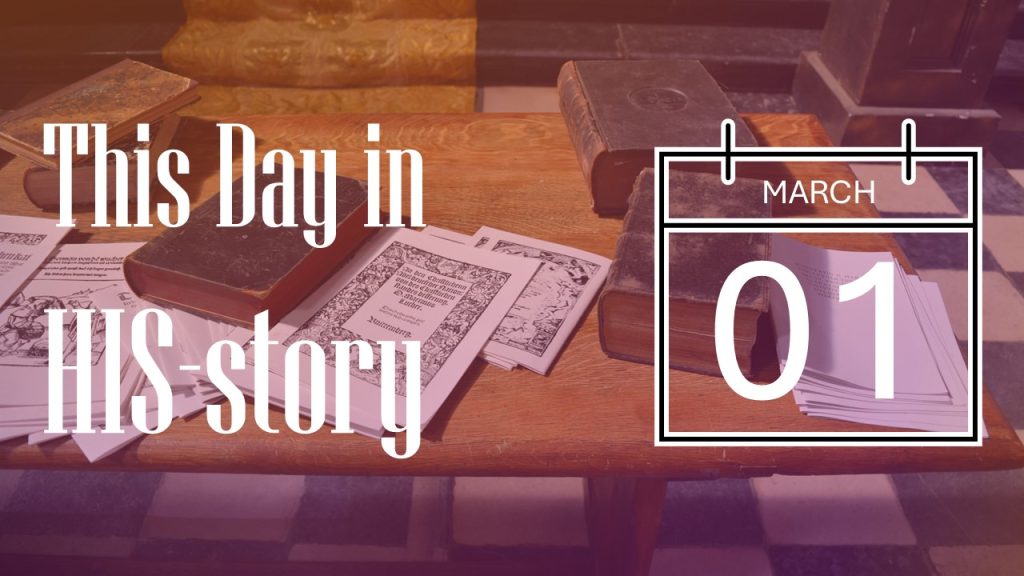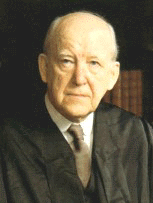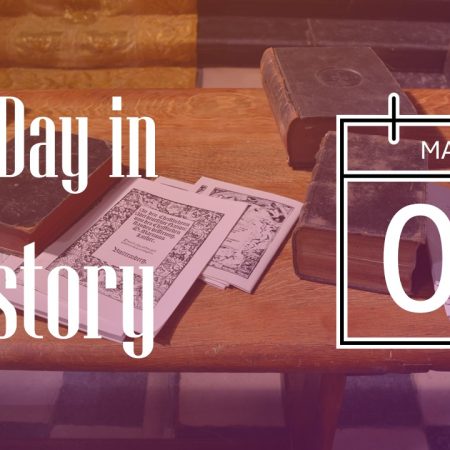
HT: Christian History Institute
1546
GEORGE WISHART preached reformation in Scotland between 1543 and 1546. Cardinal David Beaton reacted violently against him and met violence himself. That, in a nutshell, is the story of the two men.

Trained at the University of Aberdeen, Wishart became a teacher of Greek. Accused of heresy by the Bishop of Brechlin, apparently with some justification, he fled to England, where he entered Cambridge University.
In 1543 he returned to Scotland where he preached first at Montrose, then at Dundee. While at Dundee he preached on the book of Romans, a favorite of the reformers, but was driven away by the influence of Cardinal David Beaton.
Wishart went to Ayr. Beaton ordered the Archbishop of Glasgow to arrest him, but the Earl of Glencairn protected Wishart. Barred from speaking in church, Wishart preached in the market and in open fields. Learning that many in Dundee were dying of plague, he returned there and risked his life caring for the sick, especially the poor. He resumed preaching and large audiences turned out to hear him.
Cardinal Beaton hired a priest to assassinate the reformer. Wishart, sizing up the situation with a glance, seized the priest’s arm—to prevent him reaching for the knife he was carrying under his cloak—and disarmed him. The priest fell down and confessed his evil intention. The assembled crowd would have killed him had not Wishart shielded the man with his own body.
Wishart set out for Edinburgh to attend a conference of bishops; his friends sought to dissuade him and offered him protection. John Knox attempted to accompany him as a bodyguard, but Wishart, certain he himself was about to die, would not permit Knox to sacrifice his life also. At Ormiston, the Earl of Bothwell’s troops surrounded the place where Wishart was spending the night. Bothwell took him captive, saying, “I promise also in the presence of these gentlemen, that neither the governor nor the cardinal shall have their will over you, but I shall retain you in my own hands, and in my own place, till that either I shall make you free, or else restore you in the same place where I receive you.”
As it turned out, the Earl handed him over to the Cardinal, who placed him on trial for heresy on this day, 1 March 1546. An accuser read a list of charges and curses: “What answerest thou to these sayings, thou runagate, traitor, thief, which we have duly proved, by sufficient witnesses against thee?”
When Wishart tried to respond, he was silenced. “If we give him license to preach, he is so crafty, and in the Holy Scriptures so exercised, that he will persuade the people to his opinion, and raise them against us,” said the prelates. Consequently, as the accusations were read, he was allowed little chance to answer. Meanwhile the bishops openly mocked him. He was condemned and taken out that same day to be burned. Two friars called on him to “pray to our Lady, that she may be a mediatrix for you to her Son.” He refused.
Soon he was bound at the stake. The cardinal pointed artillery at the place of execution to prevent any attempt at rescue.
Among Wishart’s last words was an appeal to the crowd: “I beseech you, Christian brethren and sisters, that ye be not offended at the Word of God, for the affliction and torments which you see already prepared for me. But I exhort you that you love the Word of God, your salvation, and suffer patiently, and with a comfortable heart, for the Word’s sake, which is your undoubted salvation and everlasting comfort.”
At the executioner’s plea, Wishart forgave him. When the fire began to lick Wishart’s body, the executioner pulled tight a cord around the martyr’s neck, cutting short his suffering. Today, a plaque near the site of the execution commemorates it, and the letters “GW” on a pavement mark the spot where he died at the stake.
A few weeks after Wishart’s death, a band of high-born youth entered Beaton’s castle in the guise of workmen, waited for Beaton’s mistress to leave for the day, and stabbed the cardinal to death. They summoned John Knox to become their chaplain. Beaton was the last Scottish Cardinal before the Reformation; Knox went on to become more famous than Wishart as a Scottish reformer.
1744
JOHN NEWTON, who will one day write the hymn “Amazing Grace,” is seized by a naval press gang while ashore in England and forced into a brutal regime aboard a ship.
—Dan Graves
1981
DR MARTYN LLOYD-JONES passed away on this day. He was, surely, THE most influential preacher of the 20th century and continues to shape many lives and ministries through his writings.

I well remember being a student at the time of his death and one of my lecturers coming in to the student lounge to tell us of his passing, and doing so with tears in his eyes.
